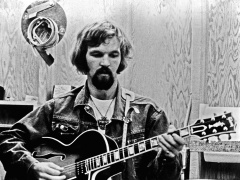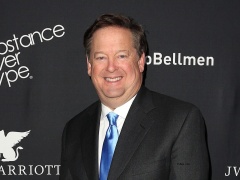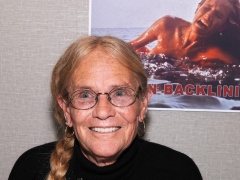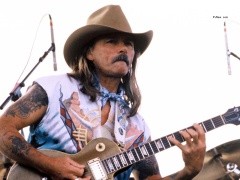
Duane Eddy, who became the first stand-alone rock ‘n’ roll guitar star with a string of instrumental hits in the late ‘50s and early ‘60s including the theme to TV series “Peter Gunn” and “Rebel Rouser,” died April 30 in Franklin, Tenn., He was 86.
A rep for the guitarist said he was surrounded by his devoted wife Deed and his family. “Duane inspired a generation of guitarists the world over with his unmistakeable signature ‘Twang’ sound. He was the first rock and roll guitar god, a truly humble and incredible human being. He will be sorely missed,” the rep said.
He notched 16 top-40 singles, including three top-10 45s, from 1958-63. In the notes for a 1993 Rhino Records compilation of the musician’s work, historian Dan Forte noted, “Duane Eddy’s first of many, many hits, 1958’s ‘Rebel Rouser,’ almost single-handedly established the institution of the guitar hero.”
“Instrumentalists don’t usually become famous. But Duane Eddy’s electric guitar was a voice all its own,” said Kyle Young, CEO of the Country Music Hall of Fame and Museum, in a statement. “His sound was muscular and masculine, twangy and tough. Duane scored more than thirty hits on the pop charts. But more importantly, his style inspired thousands of hillbilly cats and downtown rockers — the Ventures, George Harrison, Steve Earle, Bruce Springsteen, Marty Stuart, to name a few — to learn how to rumble and move people to their core. The Duane Eddy sound will forever be stitched into the fabric of country and rock & roll.”
Popular on PvNew
He attained stardom with a distinctive and influential “twangy” style that emphasized economical, melody-based picking on the low strings of his guitar, a big, hollow-body Gretsch 6120 model. (The guitar manufacturer marketed an Eddy signature model of the design in 1997.) His direct, tremolo-laden style, had an immediate impact on such younger British musicians as George Harrison of The Beatles and Hank Marvin of The Shadows, and on the legion of instrumental surf combos that sprang up in Southern California in the early ‘60s. Later, Bruce Springsteen would pay homage to Eddy’s attack in the cavernous guitar sound of “Born to Run.”
Eddy’s run of hits dried up as the British Invasion of 1964-65 shifted American listeners’ tastes, but his classic tracks would be used in more than 30 films and TV shows over the years. He periodically made iconic reappearances, and reached the charts as late as 1986 with a remake of his 1960 single “Peter Gunn” with the U.K. group Art of Noise.
He was inducted into the Rock and Roll Hall of Fame in 1994.
He was born April 26, 1938, in Corning, N.Y., and began playing guitar at the age of 5, graduating to the lap steel at 9. He performed on local radio shows; his major early influences were singing cowboys Roy Rogers and Gene Autry. The work of pop innovator Les Paul and country musicians Chet Atkins and Merle Travis would later shape his style.
When he was 13, his family moved to Arizona; three years later he acquired his red Gretsch axe. While performing with his friend Jimmy Delbridge in the duo Jimmy and Duane, he was spotted by local DJ and aspiring producer Lee Hazlewood, who cut a single with the pair.
In November 1957, 19-year-old Eddy issued his first solo single, “Movin’ n’ Groovin’,” produced by Hazlewood and his partner Lester Sill and co-written with the former. The number made the lower reaches of the national hot 100.
A pair of new Eddy-Hazlewood tunes was slated for the musician’s second single. The down-tempo, moody “Stalkin’” was selected as the A side, but its flip side caught fire after DJ and dance show host Dick Clark noted the reaction to the thumping “Rebel Rouser” at a record hop and began playing the track on his ABC network show “American Bandstand.” Released by Philadelphia’s Jamie Records in 1958, the number rocketed to No. 6 nationally.
Eddy and his production team soon settled on a winning formula that would propel several other instrumentals up the charts. Many of the guitarist’s later hits paired his guitar licks with the brawny tenor saxophone solos of studio ace Steve Douglas, who was subsequently employed on several “Wall of Sound” productions by Phil Spector, Sill’s latter-day partner in Philles Records.
Eddy’s biggest chart efforts included “Cannonball” (No. 15, 1958), “Forty Miles of Bad Road” (No. 9, 1959), a re-reading of Henry Mancini’s theme for TV’s “Peter Gunn” (No. 27, 1960) and another tube-derived number, the “Have Gun — Will Travel” theme “The Ballad of Paladin” (No. 33, 1962). His debut LP “Have ‘Twangy’ Guitar Will Travel” – one of 10 Eddy albums to reach the charts – peaked at No. 5 in 1959.
His biggest hit was the atypical, string-laden title song for the 1960 feature “Because They’re Young,” a teen drama starring Dick Clark; cut in Hollywood with session pros Barney Kessel, Howard Roberts and Shelly Manne, the single peaked at No. 4. (Eddy himself parlayed his musical fame into small roles in Western features, exploitation pics and TV shows, including “Have Gun – Will Travel.”)
Eddy’s final chart single of the ‘60s, “The Son of Rebel Rouser,” was released in 1964 and topped out at No. 97. By that time, Eddy had segued from Jamie to major RCA Records and had dabbled in albums featuring classic country repertoire, twist numbers and the songs of Bob Dylan. Later LPs for Colpix and Reprise, decidedly at odds with the music of the times, went nowhere, and he receded from commercial prominence.
He busied himself with production work in the ‘70s, working with Waylon Jennings (who had married Eddy’s ex-wife Jessi Colter in 1969), Phil Everly of the Everly Brothers and BJ Thomas.
Eddy experienced a brief high-profile resurgence of his career in the late ‘80s. The synthesizer-dominated remake of “Peter Gunn” with Art of Noise, accompanied by a droll noir-styled video, became a top-10 U.K. hit and won the 1986 Grammy Award as best rock instrumental.
In 1987, a self-titled Capitol album collected a glittering array of Eddy idolators: The set was produced by Paul McCartney, Jeff Lynne of ELO and Ry Cooder, and featured contributions from George Harrison and John Fogerty and contemporaries James Burton and Steve Cropper. A track from the album, “The Trembler” – an unusual compositional collaboration with Indian sitar master Ravi Shankar – was later used on the 1994 soundtrack of Oliver Stone’s “Natural Born Killers.”
Eddy was active into the new millennium, appearing at New Orleans’ roots-rock festival Ponderosa Stomp in 2010 and recording a 2011 album, “Road Trip,” in the U.K.






